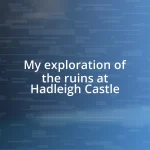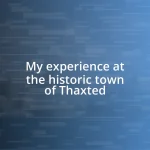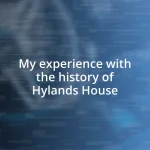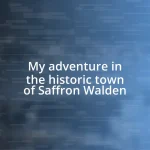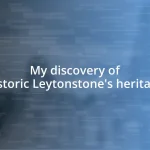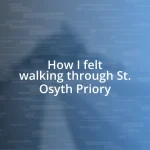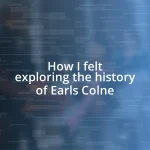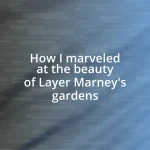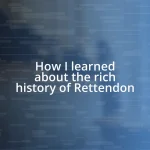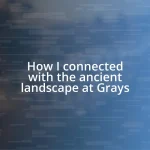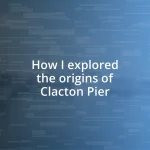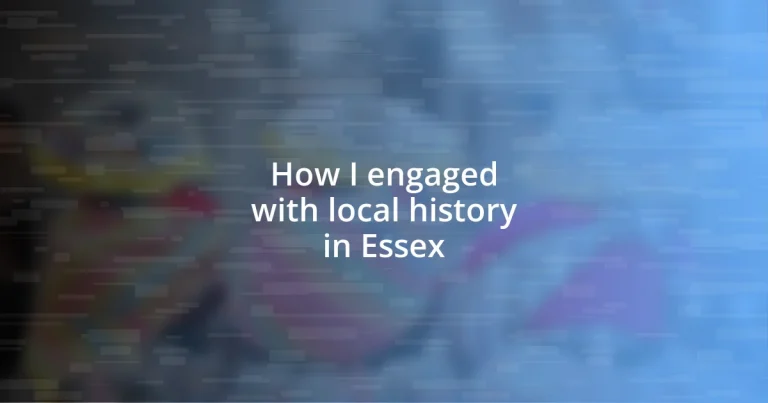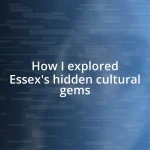Key takeaways:
- Engaging with local history fosters a deeper sense of belonging and identity, connecting individuals to the narratives of their community’s past.
- Participation in community history events, such as fairs and reenactments, allows for personal connections and collaboration in preserving local stories.
- Documenting personal experiences and sharing insights through publications enriches the understanding of history as a shared human experience, intertwining individual narratives with broader historical contexts.
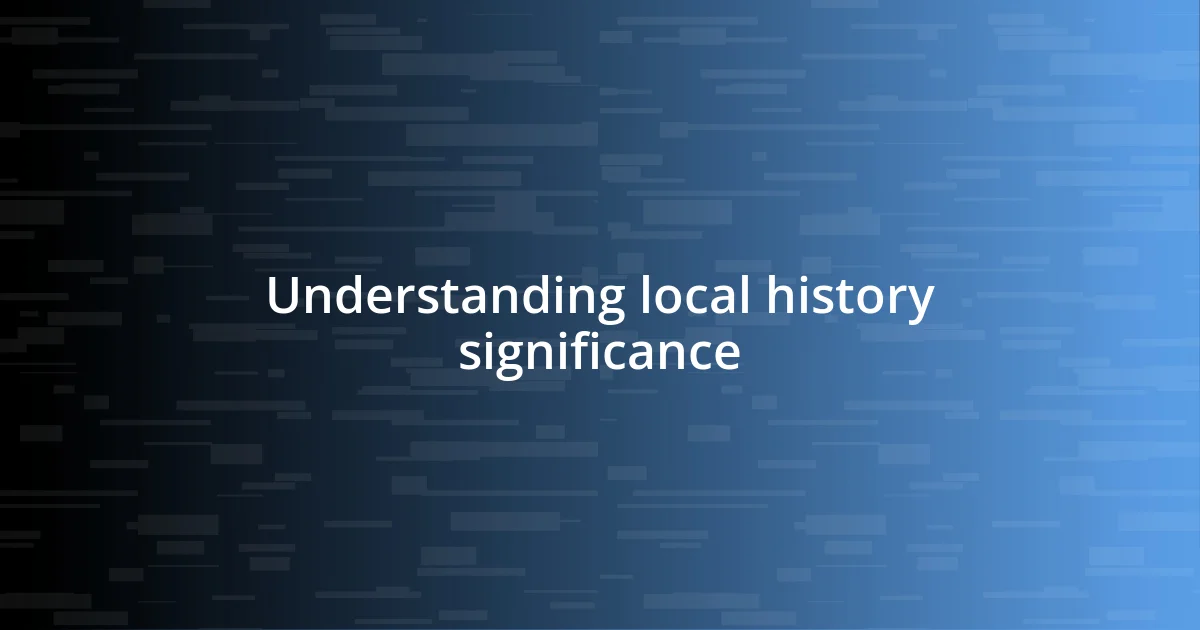
Understanding local history significance
Understanding the significance of local history can truly transform our perception of where we live. I remember standing in front of an old building in Essex, feeling a powerful connection to the past. It made me ponder: how many lives had intersected in that very space, shaping the community around me?
Delving into local history invites us to uncover stories that might otherwise remain hidden. I often find myself wondering how many individuals share the same curiosity about the forgotten tales of our neighborhoods. Each historical landmark or even the gentle curve of a familiar street has a narrative waiting to be explored, and I can’t help but feel energized by that thought.
What strikes me most is how local history fosters a sense of belonging and identity. Engaging with the past has allowed me to appreciate not just the buildings and monuments, but the tales of resilience and creativity that echo through generations. It’s fascinating to recognize how the struggles and triumphs of our predecessors have paved the way for our lives today.
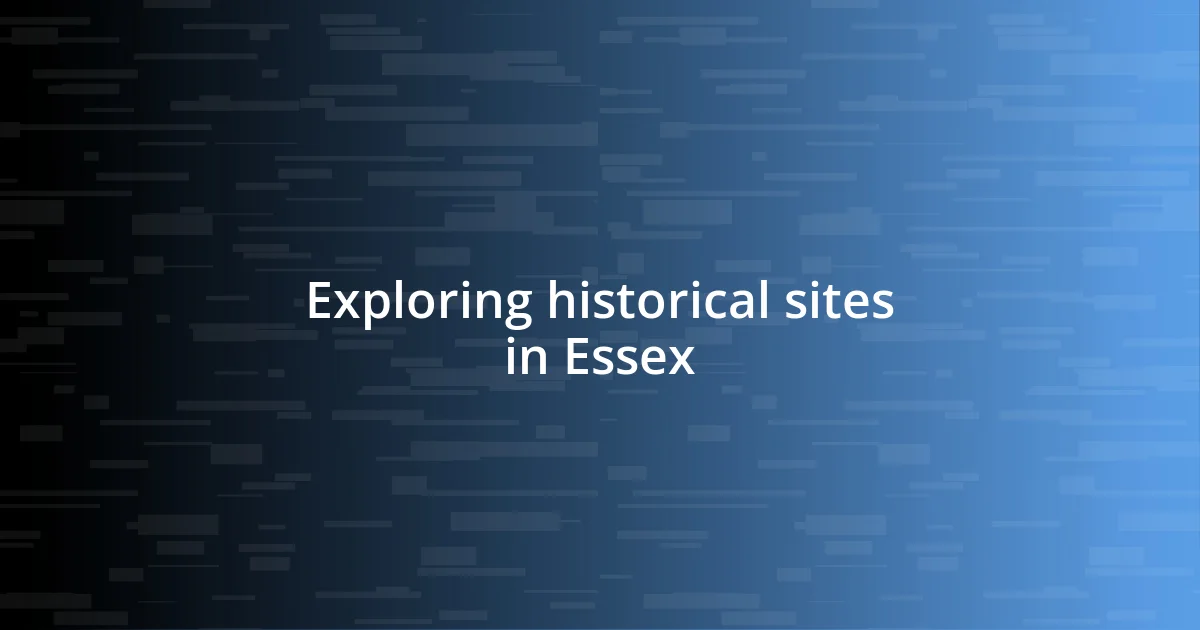
Exploring historical sites in Essex
Exploring historical sites in Essex is like stepping into a time capsule, connecting me with moments long past. I vividly recall visiting the historic Hylands House in Chelmsford, its elegant architecture whispering stories of its Victorian heritage. As I wandered through the gardens, I felt a sense of peace, as if I were sharing secrets with those who once roamed the grounds.
Here are some extraordinary historical sites in Essex worth exploring:
- Colchester Castle: A magnificent Norman structure, it holds tales of Roman conquests and medieval life. I loved picturing the knights who may have walked its halls.
- Layer Marney Tower: This stunning Tudor gatehouse ignited my imagination about the lives of the aristocrats who resided there. The views from the top were simply breathtaking!
- The Old Library in Colchester: A hidden gem, I felt invigorated by the library’s vibrant history and the countless stories contained within its walls.
- Salmon’s Wharf in Harwich: Walking along the old wharf, I could almost hear the echoes of sailors’ laughter mingling with the sound of waves—a poignant reminder of the area’s maritime past.
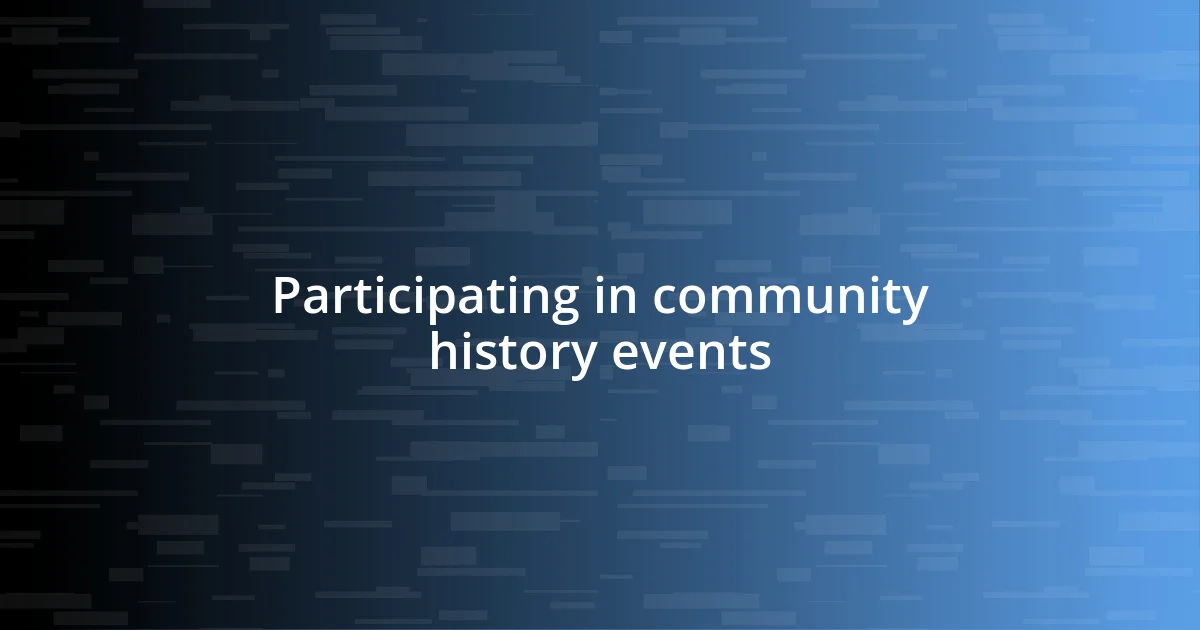
Participating in community history events
Participating in community history events has been an eye-opening experience for me. I first attended a local history fair in my town, where people gathered to share stories and artifacts. The excitement in the air was palpable, and I found myself drawn to a passionate speaker who recounted tales of shipbuilders from generations ago. Listening to those narratives, I realized how intertwined our community remains with its historical roots.
Another memorable experience involved a reenactment event at a nearby historical site. Dressed in period costumes, participants brought the past to life, and I was captivated by the authenticity. It felt like stepping back in time. Watching actors portray daily life in the 18th century allowed me to appreciate the struggles of those who came before us. It was both entertaining and a poignant reminder of our historical journey.
The friendships I’ve formed through these events are invaluable. I’ve met fellow history enthusiasts who share my passion, and we often collaborate on projects to preserve local stories. At one community workshop, I teamed up with an elder to document his family’s history. As he shared his tales, the joy on his face was infectious. This interaction highlighted the power of community engagement in preserving our past, something I cherish deeply.
| Event Type | Personal Experience |
|---|---|
| History Fair | Engaging storytelling and community sharing. |
| Reenactment | Experiencing history through immersive performances. |
| Workshops | Collaborating with community members to preserve stories. |
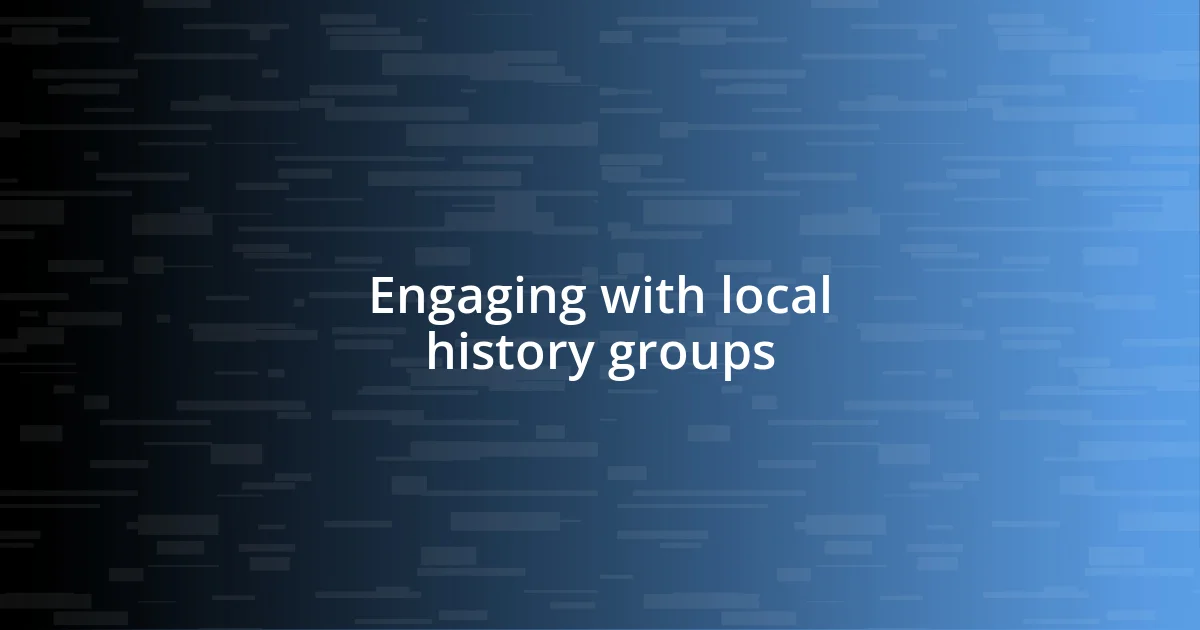
Engaging with local history groups
Engaging with local history groups has opened up a world of stories and connections for me. I remember the first time I joined a history society meeting; I was a bit nervous but excited. As I listened to the members share their passions, I realized how welcoming and enthusiastic the community is. It was heartening to witness how everyone, regardless of their background, felt a genuine kinship through their shared love of history.
One unforgettable experience was during a group-led archeological dig in a nearby village. I was amazed to physically uncover remnants of the past, digging in the dirt alongside fellow history buffs. Each artifact we found sparked lively discussions, and I felt a profound sense of unity when we all celebrated the small discoveries together. What struck me was not just what we found but the stories we imagined behind each piece—who used it and what life was like back then.
I’ve also been part of discussion groups that focus on specific eras or events in Essex’s history. In one session, we tackled the mysterious tales of the 17th-century witch trials. The stories stirred deep emotions, from disbelief to empathy, as we debated the societal pressures of that time. I left the meeting feeling enriched, and it made me wonder—how often do we reflect on these historical injustices in our modern lives? Each meeting leaves me more intrigued and determined to explore the past further, and I encourage anyone curious about history to dive in as well.

Researching archives and libraries
Researching archives and libraries has been like opening a treasure chest of local history for me. I remember the first time I set foot in the Essex Record Office, feeling a mix of excitement and awe. The smell of aged paper and leather bindings enveloped me, and as I delved into their vast collections, I felt an awakening—like I was connecting directly with my ancestors. It’s incredible how much you can learn about your community’s past, just by sifting through old letters or council records.
One particularly striking moment came when I discovered a collection of photographs from the early 1900s. Sitting at a desk surrounded by silence, I flipped through each image, and a sense of nostalgia washed over me. I found images of local festivals, families, and street scenes, all capturing the spirit of the time. It made me wonder—how many stories are hidden within these pages? Every time I leave the library, I carry not just information but a deeper attachment to Essex and its people.
I often ask myself what these archives signify in our fast-paced world. They are not just dusty old records; they are living stories waiting to be told. My visits have inspired me to consider the legacy we leave behind and how current generations can engage with history. Each visit to the library or archive feels like a personal mission, and I urge others to embark on this journey. There’s so much to uncover, and who knows what you might stumble upon that will resonate with your own story?
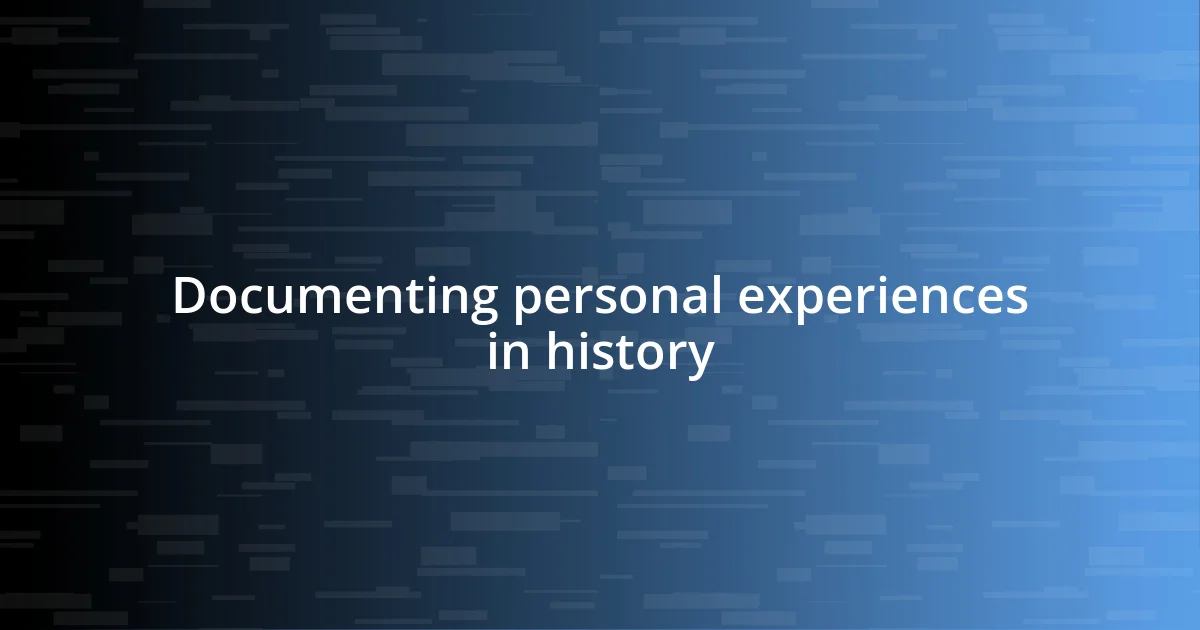
Documenting personal experiences in history
Documenting personal experiences in history is an enriching way to connect with one’s roots. I recall journaling my thoughts after visiting a historic site in Essex—a quaint little cottage that told tales of a bygone era. As I penned my reflections, I felt as if I was not just reporting the facts but weaving my own narrative into the fabric of history. Have you ever experienced a place that ignited such feelings?
There’s something deeply rewarding about recording personal insights alongside historical events. I once participated in a heritage walk, where we were encouraged to share our own family stories related to the landmarks we visited. Listening to others recount how their grandparents lived while passing by a centuries-old pub felt surreal. It made me realize—how powerful is our individual lens when viewing history? Each story added layers of meaning to the places we’d been, reminding me that history isn’t just a collection of dates and names; it’s our shared human experience.
After attending a lecture on local maritime history, I found myself reflecting on how my own family’s fishing heritage intertwined with Essex’s coastal legacy. I decided to write about it, exploring how my great-grandfather’s journey mirrored the stories of resilience we heard during the talk. Capturing these personal ties made history feel more vibrant and relatable. It begs the question—how does your personal narrative connect with the broader story of your community? Sharing these experiences creates a richer understanding of our past, allowing us to see history not just as facts, but as a tapestry of lives intertwined.

Sharing insights through local publications
Sharing insights through local publications has been a transformative experience for me. I’ll never forget the thrill of seeing my article on a little-known historical event in Essex featured in our community newsletter. Each word I wrote felt like a tribute to the past, and to know that it sparked discussions among neighbors was incredibly gratifying. Have you ever penned something that resonated so deeply with others?
There’s a distinct joy in collaborating with local history enthusiasts to contribute articles or essays to regional journals. I remember working alongside a group of fellow history buffs to compile a special edition focused on Essex’s contributions during World War II. As we shared our research, I felt a sense of camaraderie. The friendships we built while exploring our shared interests were as rewarding as the stories we uncovered.
Through local publications, I’ve witnessed how easily history can be animated. Just a few months ago, I wrote about a historic pub in the heart of my town, linking its history to tales from local patrons. The feedback was astounding—people reached out to share their own experiences in that very pub, turning a simple article into a collective memory. It’s amazing how we can weave our individual stories into the broader historical narrative, creating a tapestry of shared experiences. How has your writing made history come alive for you?
